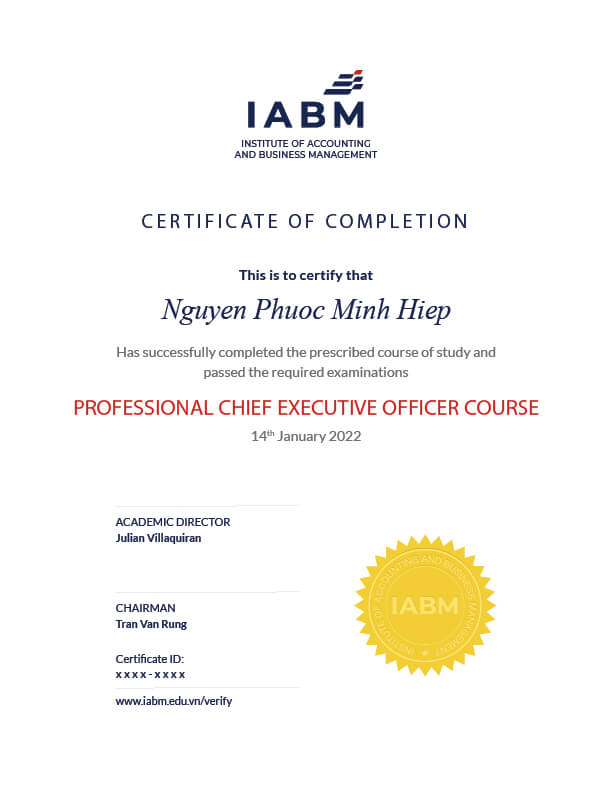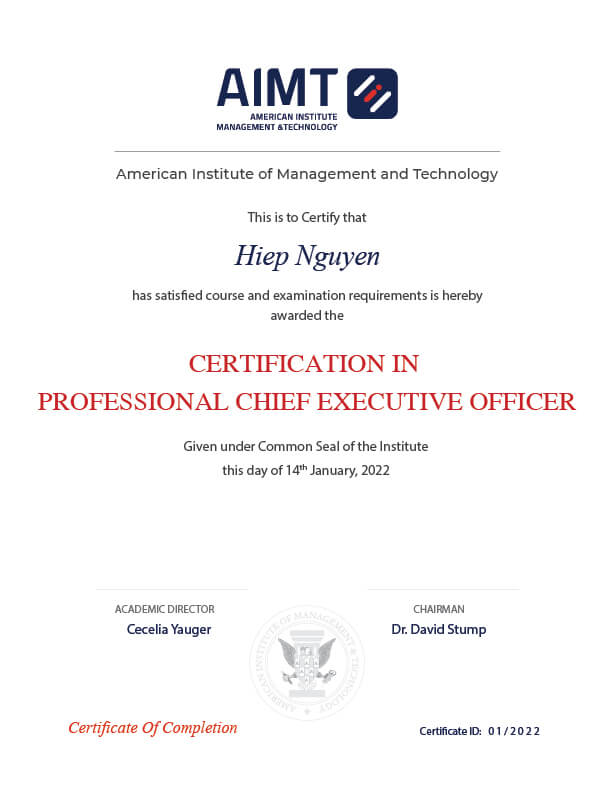The Pro CEO Training Course of IABM is designed to help leaders and managers perfect the skills and knowledge that are paramount in business management in the 4.0 era. In addition, this course will provide students without experience and management skills with an opportunity to become real CEOs after only 12 weeks.
Course Objectives
The aims of this course are to equip students with the most comprehensive knowledge in essential aspects of business administration including human resources, strategy, finance, marketing, and more. Additionally, the program will help students develop skills in applying technology to data management and processing for the purposes of optimizing business operations, resolving internal conflicts, encouraging employees to work effectively, and improving the performance of the whole company.
Who is the course for?
- Group 1: The corporate leadership level: President, CEO, Board members, Board of Directors members, Assistants to the President, Senior-Level Assistants,…
- Group 2: Middle management: Function Heads, Heads/Deputies of departments, that are in charge of divisions, individuals wishing to supplement their knowledge to advance at work
- Group 3: People who had a certain depth of knowledge or experience in business management and administration want to systemize and update their knowledge, as well as innovate their leadership skills
- Group 4: Business owners or ambitious individuals who are on the path to realizing their entrepreneurial dream
With a training program that is consulted and integrated from a set of exclusive training programs for managers from the American Institute of Management and Technology (AIMT), learners who complete one of the Director training courses at IABM will receive two valuable certificates simultaneously, including:
 |
 |
| Certificate issued by Institute of Accounting and Business Management (IABM) |
Certificate issued by American Institute Management & Technology (AIMT) |
Module 1: Rise to Leadership: Become a CEO
- Knowing the definitions of leadership skills
- Understand culture deeply and then apply your learnings by changing the way your recruiting team operates and even changing the culture of your recruiting teams
- Aware of how innovation helps you to achieve your goals
- Knowing how to create a stakeholder communication plan
Module 2: Sustainable Business Strategic Management
- Defining the context of the company
- Analyzing the Use of Strategic Management Tools and Techniques
- Learn how sustainability issues influence corporate strategy and how corporations may transform these challenges into sources of competitive advantage
Module 3: Innovation and Creativity Management
- Adopt The Characters of Innovation and explains how these characteristics are self-sustain
- Can use knowledge of the theory to create a road map for addressing critical factors in the design and marketing of product
- Can Learn From the Tech Sector’s Appropriation of Lean Thinking
Module 4: Best Human Resource Management Practices
- Engagement and interpersonal skills development
- Increased awareness of team dynamics
- An understanding of your team profile and how this can be used to create dynamic teams
- Greater knowledge of team innovation and motivation
- Improved performance management skills
- Identify and develop innovation in the team, leading to the growth of talent
Module 5: Accounting for Executives
- Understand the core concepts, terms, and techniques of finance and accounting
- Utilize financial concepts to make better-informed decisions and become a greater asset to your company
- Gain a broad overview of the financial marketplace and the role a company plays within it
Module 6: Financial Decision-making for leaders
- Identify 4 Focus Areas for CEOs in the “new normal” way of life
- Financial Compass that CEOs need to have
- Corporate Finance & The Objectives in Financial Decision Making
- What are Financial Decision Makings?
- Cost of Capital & Optimal Capital Structure
- Financial Ratios must understand for Financial Decision Making
- M&A and Prevention Tactics
- Business Valuation’s Methods
- Understanding skills for evaluating and forecasting project ideas and decisions from various perspectives
Module 7: Marketing Management and Branding
- Know how to assess and develop brands in a variety of different market settings, organization types, and policy situations
- Understanding how to analyze and apply marketing and brand communication theories
- Understanding the social, political, and cultural context of brands and the role that they can play in areas such as retail, social marketing, and marketing ethics
- Recognize the ethical issues that arise from marketing activities and understand the impact marketing has on society in general
Module 8: Business Law for Executives
- Understand Business Law; Gain essential legal knowledge to guide your business’s strategic direction, mitigate risk and make better-informed leadership decisions
- Recognize the pros and cons of various business structures
- Understanding the legal duties you may have as a business leader
- Understanding the structure and components of contracts to prepare for successful business deals
- Know how to Identify practices necessary to comply with employment law
Module 9: Operations Management
- Understanding optimize internal processes and systems in order to minimize effort and maximize profit
- Understanding skills to solve operational problems before they affect workflow
- An understanding of how different facility layouts could help or hinder production
Module 10: Information Technology in Business Administration
- Know how to plan, coordinate, and direct the computer-related activities of a business
- Understand how information systems are used to generate information for decision-making
- Apply theory to practice within the critical areas of management in 21st-century organizations
- Acquire various bodies of knowledge and competencies within specific areas of study or individual fields
- Demonstrate critical writing, thinking, calculating, and communication proficiencies
- Understand the foundation of ethical and professional standards including those specific to a field of study
Module 11: Governance, Risk Management, and Compliance
- Describe the historical development of corporate governance and its significance to organizations
- Identify the key characteristics of corporate governance including the role of internal audit and assurance within it
- Explain the key principles of risk management and the processes by which it is implemented
- Outline the methods used in risk identification and analysis
- Identify and explain risk treatment strategies
- Assess the relative benefits of embedded monitoring and independent assurance
- Explain the principles and mechanisms used in internal control.
Module 12: Leadership Manners and building personalized leadership Etiquette
- Grow Personal Mastery (continued) Vision / Strategic Thinking
- Empower Leadership Capacity in the Organization
- Develop principles, values, and integrity
Module 13: Problem-Solving and Decision-Making Skills
- Learn to understand and identify the problem and issues
- Learn to combine creative thinking and critical thinking to solve problems.
- Practice problem solving and brainstorm effective solutions
Module 14: Mindful Leadership Pathway in Digital Era
- Understand experienced leaders’ professional growth and career journeys.
- Connect personal career path with the potential development of new trends in the Digital era
- Develop the ability to overcome personal difficulties, setbacks, and turbulence.
- Know how to balance a realistic assessment of the predicament with an optimistic drive.
- Become more grounded, resilient, defensive, and perceptive
| No. | Modules | Time | |
|---|---|---|---|
| Session | Periods | ||
| 1 |
Rise to Leadership: Become a CEO
|
1 | 4 |
| 2 |
Sustainable Strategic Management
|
3 | 12 |
| 3 |
Innovation and Creativity Management
|
2 | 8 |
| 4 |
Effective Human Resource Management Practices
|
3 | 12 |
| 5 |
Accounting for CEO
|
3 | 12 |
| 6 |
Financial Decision-making for leaders
|
3 | 12 |
| 7 |
Marketing and Branding Management
|
2 | 8 |
| 8 |
Business Law for CEO
|
2 | 8 |
| 9 |
Operations Management
|
2 | 8 |
| 10 |
E-business model and its competitive advantage
|
2 | 8 |
| 11 |
Governance, Risk Management and Compliance
|
2 | 8 |
| 12 |
Leadership Styles and Leadership Etiquette
|
2 | 8 |
| 13 |
Problem-Solving and Decision-Making Skills
|
2 | 8 |
| 14 |
Mindful Leadership in the digital era
|
2 | 8 |
| 15 |
Telling true stories and sharing the CEO's practical experience
|
1 | 4 |
| 16 |
Networking Event with Executives from Multinational Organizations
|
1 | 4 |
| 17 |
Workshop with Executives from Multinational Organizations
|
1 | 4 |
| 18 |
Graduation Ceremony
|
1 | 4 |
|
Total
|
35 | 140 | |
| Course | Duration | Opening | Schedule | Time |
| Pro CEO – Professional Chief Executive Officer | 20 days / 80 periods | 21/11/2022 | Mon – Wed – Fri evening | 18h00 – 21h00 |
|
Mr. Alvin Koh |
Mr. Julian Villaquiran |
Mr. Gustavo Paez |
Mr. Sergio Pereira da Silva |
|
Ms. Kel Norman |
Dr. Miguel A. Ferrer |
Mr. Luu Khanh Truong |
Dr. Thien Sanh Dai |
|
Dr. Pham Ngoc Tuan |
Dr. Nguyen Van Huong |
Dr. Huynh Duc Truong |
Dr. Le Quang Hanh |
|
Mr. Le Anh Thang |
Dr. Nguyen Thanh Tung |
Mr. Phan Hoai Nam |
Mr. Bui An Son |
|
Dr. Le Ngoc Loi |
Mr. Ngo Vuong Tuan Kiet |
Mr. Hoang Thai Tu |
Ms. Pham Thi Kieu Nga |
|
Mr. Nguyen Hoang Thinh |
Mr. Le Hoang Anh |
Mr. Bui Dang Bao |
Mr. Phan Dinh Tuan Anh |
*Required information field

























